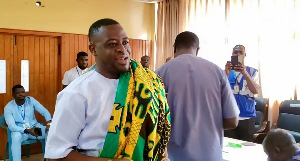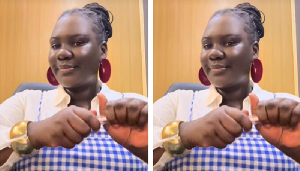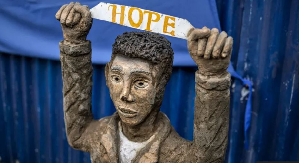Fifty-Four Adolescent Health Corners aimed at increasing access to information and services on Adolescent Sexual Reproductive Health (ASRH) to the youth, have been established in the Brong-Ahafo Region.
The Department of International Development (DFID) of the United Kingdom Agency for International Development (UKAID) together with the Government of Ghana, are providing funding to set up two of these facilities in each of the eight Municipal and 19 District Assemblies in the Region.
A total cost of GH?6 million has been put to the construction of entirely new facilities and others renovated from old structures, as well as their refurbishment, under the venture named "Ghana Adolescent Reproductive Health" (GHARH) Project.
The Head of DFID in Ghana, Mr. Jim McAlpine announced this at the handing over ceremony of one of these at the Acherensua Health Centre in the Asutifi South District in the Region.
The Ghana Health Service (GHS), is the main implementing body with multiple collaborative support from Palladium, a UK-based Non-Governmental Organisation (NGO), the National Youth Authority (NYA), the Ghana Education Service (GES) and the National Population Council (NPC).
Other activities to be considered under the project, are the formation of health clubs for in-school and out-of-school youth by the School Health Education Programme (SHEP) Unit of the GES.
Mr. McAlpine said the Corners had special opening hours, dedicated staff and materials on reproductive and sexual health tailor-made for young men and women and was optimistic that the services would be transformational in shaping the lives of many adolescents in the Region with ripple effects to other Regions.
Mr. Justice Samuel Adjei, the Deputy Brong-Ahafo Regional Minister, said a lot of successes had been achieved since the launch of the Project in 2014 and cited that about 51,426 adolescents through the Corners had accessed adolescent- friendly sexual reproductive health (ASRH) services and information.
“About 6,245 health and education workers as well as monitoring and valuation officers had been trained to enhance their capacity to deliver components of adolescent-friendly health services”, he added.
Mr. Adjei said about 288,782 individuals had also been reached to increase their awareness concerning ASRH in the Region, adding that the Project had also supported public and private stakeholders at national and sub-national levels to plan, manage, implement and monitor ASRH programmes.
He however said despite those significant achievements, there was growing concern of its sustainability after the end of the funding period in 2017.
Health News of Tuesday, 19 April 2016
Source: GNA












